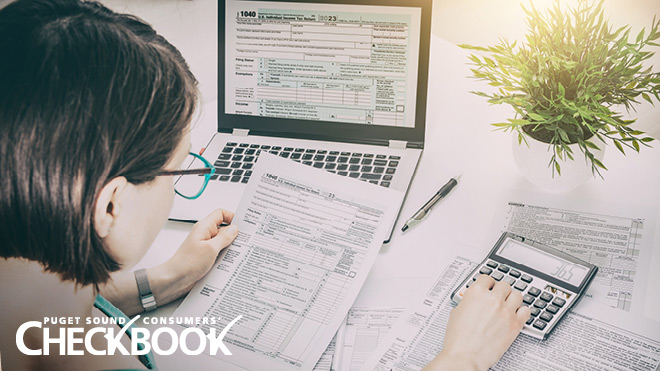
5 Common Tax Filing Mistakes To Avoid
Spring is here, which also means the deadline to file your taxes is right around the corner. No matter how you file, beware of these common mistakes.
We all make mistakes — but they can cost you money on your taxes. Did you know the IRS makes updates to tax provisions each year? Before you begin filing your taxes, be sure to brush up on any changes.
Then review these common errors, so you don't wind up paying more in taxes and penalties.
1. Entering Information Inaccurately
When completing your tax return, be sure to double check your personal information like your Social Security number and birthdate. If you are rushing to fill out your forms, it's easy to mistype numbers.
To prevent missteps, make sure you double check this information:
- Bank account number: If you're due for a refund and choose direct deposit, make sure you enter your correct routing and account number.
- Social Security number: Your Social Security number should appear on your tax return exactly as it appears on your Social Security card.
- Your math: Mistakes can range from simple addition, subtraction or multiplication errors to entering a completely wrong number on a line. Always check numbers — or consider using tax preparation software to crunch the numbers for you.
- Your name: If you have changed your legal name due to marriage, divorce or any other reason, be sure to let the Social Security Administration know as soon as possible. If you file taxes with a different name than the IRS or SSA have on file for you, your refund could be delayed or not processed.
2. Forgetting To Include All Your Income
If your only income is from one traditional job, your tax filing is more likely to be straightforward. If you have a side gig, work as a freelancer or have additional sources of income, be sure to count that as income when preparing your tax return.
3. Missing out on Tax Credits and Deductions
Keeping up with tax credits and deductions can be daunting, but the benefits can help you reduce your tax bill or increase your refund.
Tax credits are available for a variety of situations. Check to see if you're eligible for these and other credits:
Deductions can also help you reduce your taxes or increase your refund. Deductions work by decreasing the amount of your income that's taxable.
You can either take a standard deduction or, if your total deductible expenses are greater than the standard deduction, you can itemize deductions. Itemized deductions could include:
- State and local taxes.
- Property taxes.
- Mortgage interest.
- Disaster losses.
- Charitable donations.
- Medical and dental expenses.
- Losses from theft.
Add up your deductions on the IRS itemized deductions form (PDF) or use tax preparation software to figure out if you should stick with the standard deduction or itemize.
4. Selecting the Wrong Filing Status
Some taxpayers accidently enter the wrong filing status. This can place you in the wrong tax bracket and make you ineligible for deductions and credits.
There are five tax filing statuses:
- Single.
- Married filing jointly.
- Married filing separately.
- Head of household.
- Qualifying widow(er) with dependent child.
Make sure to choose the right status for you.
5. Failing To Sign and Date Everything
One of the easiest and most important steps of filing is signing and dating your return. If you are filing electronically online, you can sign and date your forms digitally, or you can use a PIN number.
If you are filing paper forms, be sure to look your forms over before mailing to make sure you have signed and dated everything appropriately.


